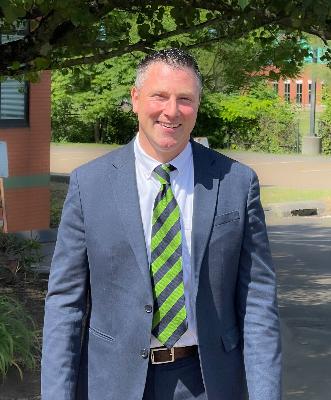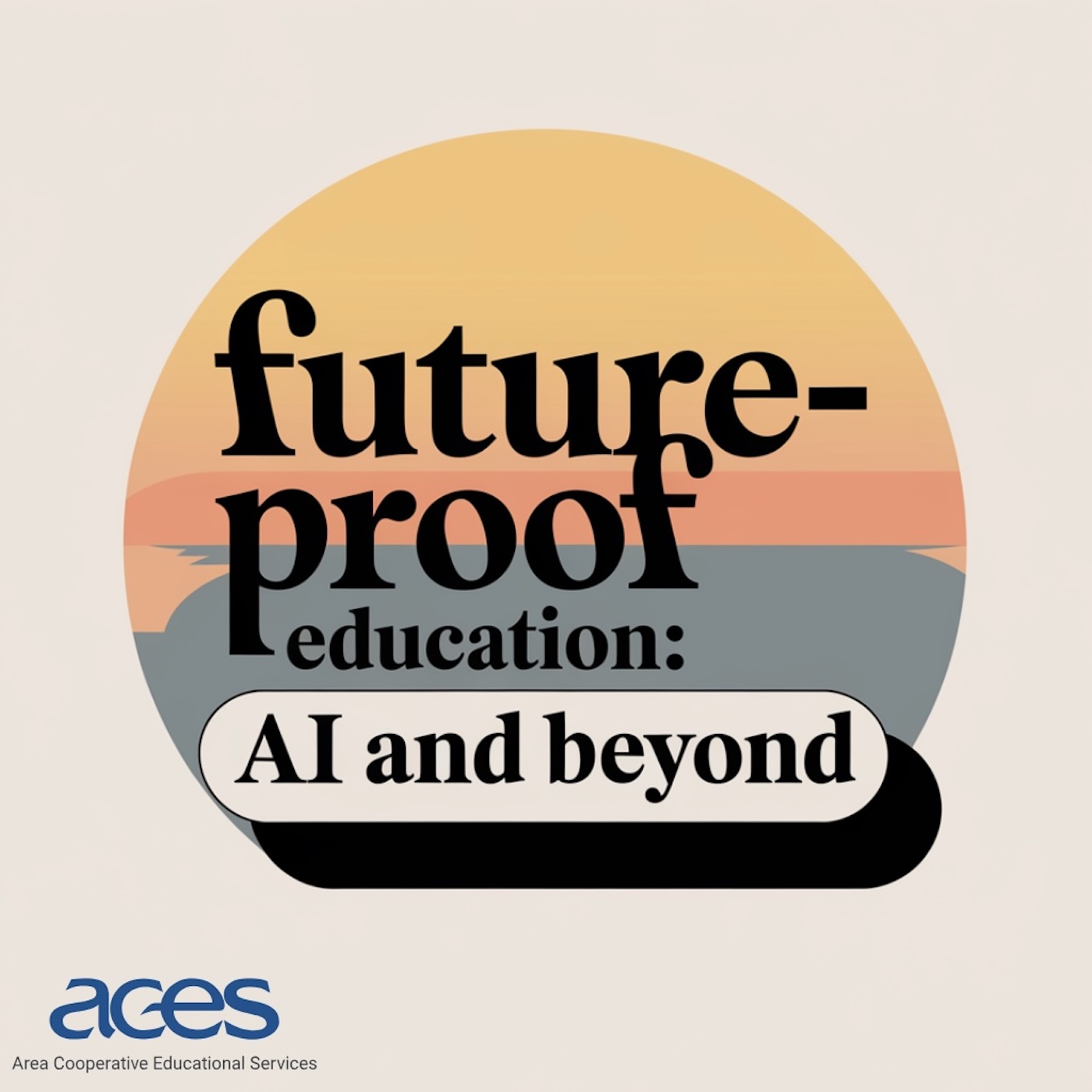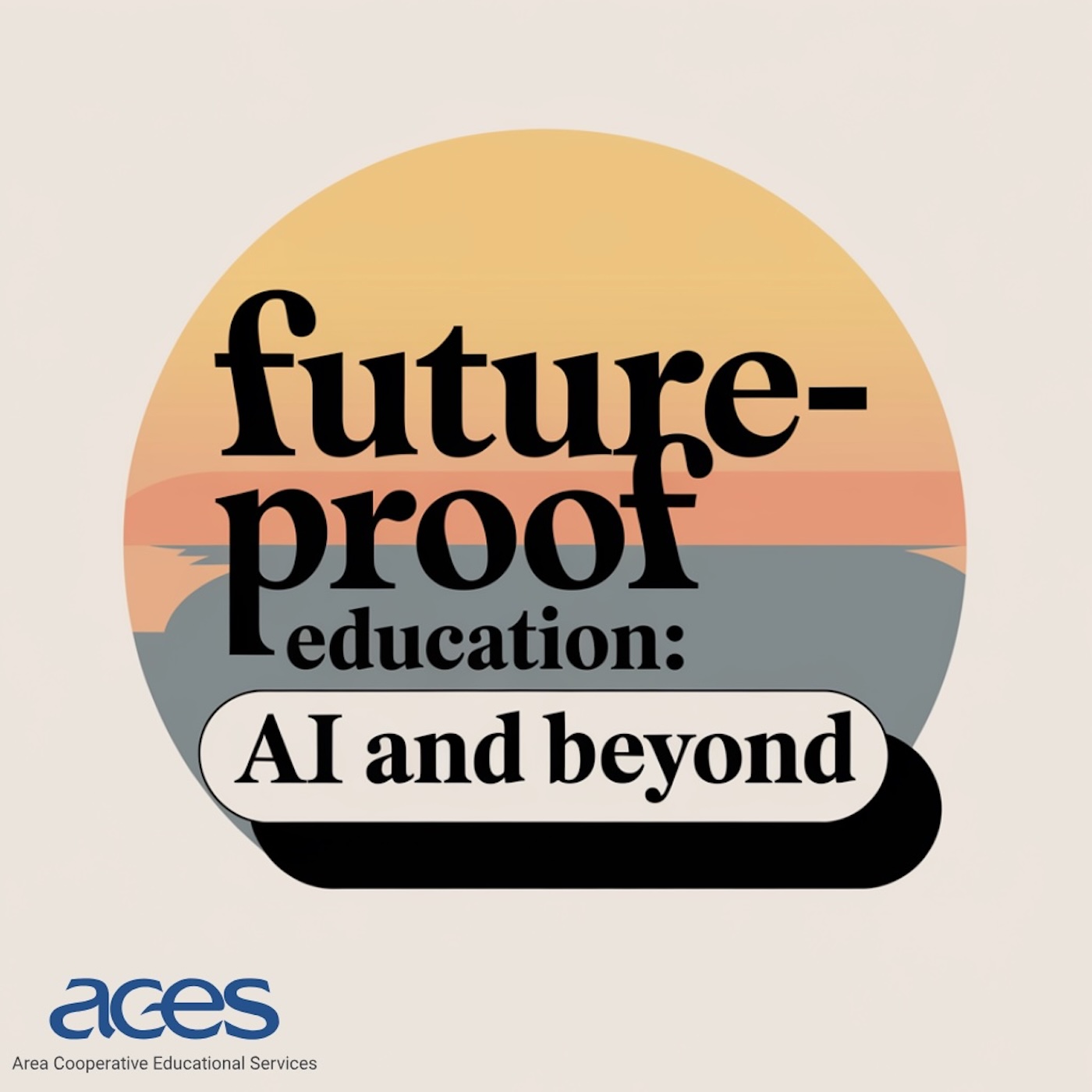Discover Future-proof Education: AI and Beyond
Future-proof Education: AI and Beyond

Future-proof Education: AI and Beyond
Author: Bob Hutchins
Subscribed: 1Played: 10Subscribe
Share
© 2025
Description
A production of ACES (Area Cooperative Educational Services). The podcast where we explore how artificial intelligence is transforming school operations—freeing up time, improving efficiency, and helping educators and administrators focus on what truly matters.
15 Episodes
Reverse
Season 2 opens with a raw and timely conversation between Bob Hutchins and Tim Howes about one of education's biggest challenges: academic integrity in the age of generative AI. As schools race to adapt, many are responding with surveillance and bans, but Bob and Tim ask a deeper question-what if the problem isn't AI, but the system itself? They explore how generative tools are not creating dishonesty but revealing cracks in outdated assessment models, why detection software erodes trust, and how educators can rethink learning through transparency, reflection, and prompt literacy instead of punishment. 🧠 Key Themes Redefining Academic Integrity: Integrity is no longer about "doing your own work," but about demonstrating your own judgment and transparency in using AI responsibly. Policing vs. Trust: Detection tools and AI surveillance create a culture of suspicion. True integrity grows from relationships, mentorship, and open dialogue. Systemic Rot in Education: AI didn't cause dishonesty—it exposed how transactional learning and grade-focused systems fail to nurture genuine understanding. Prompts as the New 'Show Your Work': Instead of grading AI outputs, teachers can assess the quality of a student's prompts, which reveal depth of knowledge and critical thinking. Inequity and the AI Divide: Well-resourced schools teach AI fluency. Others teach avoidance. Without intervention, AI will widen the digital divide between students who learn to use it creatively and those who are punished for it. 💬 Quotes from the Episode "Detection doesn't build honesty. Relationships do." – Tim Howes "If AI can do the task, maybe it's the wrong task." – Tim Howes "Integrity wasn't working before AI. Generative tools just made the cracks visible." – Bob Hutchins "Grading the prompt, not the output, reveals the student's understanding." – Bob Hutchins
In this special episode, we pause our usual conversations with educators and leaders to reflect on an essay I wrote, Teaching Humans, Not Machines. For decades, schools trained students to follow procedures, memorize answers, and perform for tests. The irony is that artificial intelligence now does those things better than we ever could. We look at how systems shaped students to value compliance over curiosity, performance over presence, recall over reasoning—and how that left us vulnerable to disruption. But we also ask a deeper question: what capacities remain irreducibly human? From attention and intellectual courage to real curiosity and creativity, these are the skills that can't be automated. They're also the very foundation of citizenship and meaningful life. If we want education to serve people instead of machines, we need to reclaim and cultivate them. The article is here at https://bobhutchins.substack.com/p/teaching-humans-not-machines
📝 Episode Summary: In this back-to-school conversation, Bob Hutchins sits down with Tim Howes to explore how schools can embed AI literacy into the core of teaching and learning—without losing the skills, creativity, and human connection that make education meaningful. Together, they tackle questions on what belongs on a "must teach" list when AI can already perform so many traditional academic tasks, and how to ensure AI literacy isn't siloed off as a tech elective. They discuss the importance of transferable skills like critical thinking, collaboration, and adaptability, as well as emerging competencies such as prompt engineering, evaluating AI outputs, and blending human judgment with AI-generated insights. The discussion also dives into the balance between AI-assisted learning and friction-rich, manual experiences that build resilience, the role regional service centers like ACES can play in shaping state and national AI priorities, and how today's first-graders might graduate looking very different from today's seniors. 🔍 Topics Covered: What to prioritize on the "must teach" list in an AI era Why AI literacy should live alongside—and within—core subjects Skills that will gain importance because of AI, not in spite of it Prompt engineering as a foundational literacy skill Evaluating and interpreting AI outputs with a critical eye Balancing AI-assisted learning with productive struggle The role of service centers in piloting curriculum and influencing policy A vision for the AI-literate graduate of the future 🧠 Key Quotes: "AI shouldn't be a siloed tech skill—it's an appliance we'll use in every discipline." "Prompting well is just asking better questions—and that's a skill we've always needed." "We can use AI to create more manual learning experiences, not fewer." 📌 Who It's For: Educators, administrators, policymakers, curriculum designers, and anyone shaping the future of learning in the age of AI. 🔗 Resources & Mentions: ACES Innovation and AI initiatives AI literacy integration models for K–12 Federal AI literacy funding announcements Prompt engineering strategies for educators
In this thought-provoking conversation, Bob Hutchins sits down with Dr. Kris DeFilippis, a former K–12 educator turned NYU professor, to explore the collision of AI, education systems, and equity. With experience ranging from custodian to assistant superintendent, Kris brings a rare, ground-level and systems-wide perspective to what's happening in schools as artificial intelligence gains traction. They unpack the myth that AI is just a tool—and discuss how it may instead be a disruptive force demanding a full rethinking of how schools operate, assess, and serve. Kris shares candid reflections on how AI risks becoming a shortcut that bypasses meaningful equity work unless leaders adopt a mindset of epistemological humility and deep systems inquiry. They also dig into real-world use cases, emerging policy gaps, and the paradoxical possibility that AI—if implemented wisely—could return us to the human core of education: agency, relationships, and community engagement. 🔍 Topics Covered: The system-level tension AI is creating in public education Why AI should not be treated as a neutral tool The danger of automating existing inequities Reframing assessment beyond regurgitation Giving teachers and leaders time back for human-centered work What transformation means vs. mere adoption The myth of AI cheating and what it reveals about student motivation Redefining educational leadership in the AI era 🧠 Key Quotes: "If AI is giving you time back, use it to ask better questions—not just do more of the same." "AI can't replace human judgment, but it will reflect it. So we better be sure we know what we're putting in." "Equity isn't a side hustle. It has to be embedded into how we implement every single thing—including AI." 📌 Who It's For: Superintendents, school leaders, policy-makers, professors, tech developers, and educators who want to engage AI thoughtfully, ethically, and systemically. 🔗 Resources & Mentions: NYU Educational Leadership & Policy programs Rutgers Disproportionality & Equity Lab 21st Century Ed & https://pdgogy.ai/ https://www.linkedin.com/in/kris-defilippis/
In this insightful episode, Bob speaks with Olga Simoes, CFO of the Association of Educational Service Agencies (AESA), about the financial realities behind educational innovation. Drawing from her time at ACES and her current national role, Olga shares how leaders can navigate limited budgets while making forward-thinking decisions that prepare students — and schools — for an AI-driven future. Olga opens up about: The tension between what's needed and what's possible in today's educational funding landscape How to evaluate new technologies and avoid investing in the "shiny object" trap Building a culture that embraces change — not just in tools, but in mindset Why financial leaders need to zoom in and out — from spreadsheets to classrooms How to budget for long-term transformation, not just short-term fixes What future-ready hiring and workforce development will require Whether you're an educational leader, financial administrator, or someone interested in how change happens behind the scenes, this episode offers a grounded, thoughtful look at how money, mission, and innovation meet. Links & Resources: Learn more about AESA- https://www.aesa.us/ ACES (Area Cooperative Educational Services)- https://www.aces.org/ Connect with Olga Simoes on LinkedIn- https://www.linkedin.com/in/olga-simoes-804007112/ Subscribe to Future Proof Education: AI and Beyond for more episodes on technology, leadership, and the future of learning
👤 Guest: Autumn Caraglio, Reading Specialist at ACES Mill Road School, North Haven, CT 📝 Episode Summary: In this episode, Bob Hutchins speaks with Autumn Caraglio, a reading specialist at ACES Mill Road School, where she works with K–8 students facing profound emotional, behavioral, and academic challenges. Autumn brings over a decade of experience in trauma-informed, individualized literacy instruction—and she's not afraid to ask hard questions about what edtech gets right, and where it still falls short. Together, they explore how AI tools—when used thoughtfully—can support students' self-confidence, personalize reading interventions, and remove the social stigma around struggling readers. Autumn shares real-world examples of how tools like speech-to-text, AI-powered feedback systems, and offline prompt engineering help her students learn, express, and grow. She also highlights the danger of relying on "shiny" tools that aren't built for nuance—and how she evaluates which tech tools to bring into her practice. If you've ever wondered what real personalization looks like for students with complex needs, or how AI can quietly empower rather than overwhelm, this episode offers a grounded and deeply human perspective. 🔍 Topics Covered: How trauma-informed reading instruction reshapes traditional literacy models The role of trust, repetition, and relationship-building in reading interventions How AI can enhance offline instruction and reduce screen dependency What to look for—and avoid—in AI-powered literacy tools Why personalization must be relational, not just algorithmic The emotional benefits of private, self-paced AI feedback Ethical concerns and emotional intelligence gaps in edtech How Autumn helps staff adopt and adapt tech with curiosity, not pressure 🧠 Key Quote: "AI should never lead—it should support. Especially when you're teaching kids who've been told they can't." – Autumn Caraglio 📌 Who It's For: Literacy coaches, special educators, administrators, edtech designers, and anyone committed to creating inclusive, compassionate, and future-ready classrooms. 🔗 Resources & Mentions: ACES Mill Road School, CT. AI-powered fluency and IEP goal-writing tools Tools mentioned: ChatGPT, Claude, MagicSchool, Adobe, Canva, HMH Ed Trauma-informed reading practices
👤 Guest: Tim Howes, Assistant Executive Director at ACES (Area Cooperative Educational Services) 📝 Episode Summary: In this episode, Bob Hutchins sits down with education leader Tim Howes to unpack a recent Gizmodo article provocatively titled "It's Breathtaking How Fast AI is Screwing Up the Education System." Rather than reacting with fear or fanfare, Bob and Tim take a grounded, inside-the-classroom view of what's really happening as AI makes its way into schools. They discuss whether AI is truly "destroying the soul of learning" or simply surfacing long-standing issues in curriculum design, student engagement, and outdated assessment models. Tim brings clarity from the front lines—sharing how teachers and students are already using AI to scaffold learning, personalize instruction, and reduce stress. Far from replacing deep thinking, AI may be sparking it in new and more accessible ways. 🔍 Topics Covered: Why panic headlines miss the deeper story of AI in education AI as a mirror for broken pedagogy—not a destroyer of learning Student agency, motivation, and what "cheating" actually reveals Using AI for differentiated instruction and real-time feedback Empowering neurodivergent and multilingual learners with AI tools Examples of classroom collaboration using generative tools How AI can restore trust in the teacher-student relationship Defining the real "soul of learning" in a tech-driven age 🧠 Key Quote: "The soul of learning is agency. And AI, if we're thoughtful, doesn't take that away—it protects it." – Tim Howes 📌 Who It's For: Superintendents, school leaders, classroom educators, edtech innovators, and anyone who wants to move beyond the fear and into practical, human-first conversations about AI in learning. 🔗 Resources & Mentions: Gizmodo Article: "It's Breathtaking How Fast AI Is Screwing Up the Education System"- https://gizmodo.com/its-breathtaking-how-fast-ai-is-screwing-up-the-education-system-2000603100 ACES AI Certification Program for Educators- https://www.aces.org/services/professional-learning/workshops
👤 Guest: Virginia "Jenny" Tagliatela, Principal of Village School, North Haven, CT 📝 Episode Summary: In this episode, Bob Hutchins sits down with Virginia "Ginny" Tagliatela, the dedicated principal of Village School—an extraordinary program serving students with profound cognitive, medical, and behavioral support needs. Together, they explore how AI is being thoughtfully introduced into special education—not as a one-size-fits-all solution, but as a responsive, human-centered tool that adapts to each child's unique way of learning and communicating. From eye gaze communication software to real-time feedback for teachers and students, Jenny shares practical examples, hard-earned lessons, and a vision of AI that respects human dignity and prioritizes emotional connection. She also discusses how professional development and family engagement are evolving in response to this shift—and what it takes to create ethical, inclusive tech integration in a high-support learning environment. 🔍 Topics Covered: What AI readiness really means in special education Why personalization is non-negotiable in inclusive learning environments How generative tools are helping modify curriculum accessibly The role of AI in emotional regulation and sensory awareness Ethical concerns, staff training, and overcoming resistance Collaboration across medical, behavioral, and academic domains Preparing students for independence beyond school using AI 🧠 Key Quote: "AI should enhance what educators do—not replace it. In special education, it has to be adaptive, not just efficient." – Virginia Tagliatela
In this episode of Future-Proof Education: AI and Beyond, we continue our conversation with Melissa Alers, World Languages Coordinator at ACES in New Haven, Connecticut. This time, we delve into the intersection of artificial intelligence and language services in education, exploring how AI can support, yet not supplant, the human elements essential to effective communication. Key Topics Discussed: The critical importance of centering language services in schools to promote access and equity, especially in the context of AI readiness. Current challenges and successes in interpretation and translation within educational settings, highlighting the increasing demand for these services. The limitations of AI in translation, particularly its struggles with context, cultural nuances, and dialects, underscoring the continued need for human oversight. Concerns from families and educators regarding AI-based translations, focusing on issues of trust, accuracy, and the potential for miscommunication. The balance between leveraging AI for cost-effective scalability in translation services and avoiding a "good enough" mindset that may compromise quality. Practical steps for school leaders to enhance language services using technology, including conducting language access surveys and combining AI tools with human expertise. Melissa shares real-world examples of how AI can assist in translation tasks, such as modifying translated materials, while emphasizing the indispensable role of human interpreters in capturing the full meaning and cultural context of language. She advocates for a collaborative approach where AI serves as a tool to augment human capabilities, ensuring that all students and families receive accurate and culturally sensitive communication. Stay Connected: Subscribe to this podcast for more insightful discussions on integrating AI in education while maintaining the essential human touch. Don't forget to like and review to help us reach more educators and leaders navigating the evolving landscape of AI in schools.
In this episode of Future-Proof Education: AI and Beyond, we engage in a practical and timely conversation with Tim Howes, Deputy Executive Director at ACES in New Haven, Connecticut. Tim brings decades of experience as an educator, principal, and executive leader to unpack what it really means to build an AI-ready school—beyond the buzzwords and into the real work of culture change, systems thinking, and purposeful implementation. Key Topics Discussed: Defining the AI-Ready School: Tim shares how being AI-ready isn't about flashy tools or tech upgrades—it's about cultivating the vision, systems, and school-wide mindset to support AI integration as a learning and operational tool. Culture Before Tools: Why lasting AI implementation begins with leadership modeling curiosity, vulnerability, and a growth mindset—especially for educators who may not see themselves as "tech people." Misconceptions About AI in Schools: Addressing fears that AI will replace teachers or require major overhauls. Tim reframes AI as a scaffold, not a silver bullet, and reminds us that educators still sit at the heart of learning. Student Voice and Co-Design: How inviting students into the conversation helps make AI adoption more relevant and equitable. Tim shares a cafeteria redesign story that illustrates the power of listening to student needs. Overlooked Systems That Block AI Readiness: From outdated procurement processes to siloed student data, Tim breaks down the "unsexy" infrastructure that can either stall or support meaningful AI adoption. Generational Shifts in Tech Fluency: Why today's students—digital natives—are often learning AI alongside their teachers, making it essential to build collaborative, exploratory classroom environments. Getting Started on a Budget: Tim outlines practical first steps for schools with limited funding—like piloting free AI tools and focusing investment on professional learning rather than hardware. Why Now Is the Time to Begin: Waiting for the "perfect" moment or tool delays the inevitable. The earlier educators engage with AI, the more confident and effective they'll be in guiding students through it.
Episode Description In this episode of Future-Proof Education: AI and Beyond, Kevin Keating, Director of Pupil Services at ACES, shares how AI is beginning to reshape special education. Drawing from years of experience as a special ed teacher and assistive tech consultant, Kevin offers practical insights on using AI to support teachers, personalize instruction, and ease administrative load—without losing the human connection that matters most. Key Topics Discussed: Addressing Staff Shortages with AI: How AI helps educators manage large caseloads and support diverse learners without replacing human expertise. Breaking Down Barriers to Adoption: Why many teachers are hesitant—and how small wins in lesson planning and differentiation can shift mindsets. Personalization and Inclusion: Real examples of AI being used to adapt content and bridge language gaps for multilingual students. Building Trust with Parents: The importance of clear, personal communication when introducing AI in special education settings. Ethics and Data Privacy: Best practices for protecting student information and using AI responsibly in schools. Advice for Schools: Start with the right people, the right use cases, and a commitment to keeping students at the center. Subscribe to Future-Proof Education for more grounded, human-first conversations on AI in K–12 schools.
In this episode of "Future-Proof Education: AI and Beyond," we continue our conversation with Dr. Jessica White, Assistant Director for AI Services and Product Development at ACES in New Haven, Connecticut. This time, we delve into the transformative role of AI in K-12 education, exploring its potential to enhance teaching practices and student engagement. Key Topics Discussed: AI's Role in Developing Research-Based Strategies for K-12 Education: Dr. White highlights how AI tools, such as ChatGPT, assist educators in crafting lesson plans that incorporate high-leverage, research-based strategies. By providing diverse instructional approaches, AI enables teachers to differentiate instruction effectively, catering to the varied needs of students. Enhancing Student Understanding and Engagement Through AI Applications: The conversation touches on AI's capability to introduce innovative teaching methods, moving beyond traditional practices. For instance, AI-powered platforms can offer interactive and personalized learning experiences, fostering greater student engagement and comprehension. Addressing Misconceptions and Building AI Literacy Among Educators: Dr. White discusses the initial apprehensions educators may have regarding AI, often stemming from misconceptions about its role in education. She emphasizes the importance of professional development and collaborative learning to build AI literacy, enabling teachers to harness AI's potential responsibly and effectively. Ethical Considerations and Mitigating Bias in AI Applications: The discussion underscores the need for ethical integration of AI in education. Dr. White advocates for the establishment of AI committees within school districts to develop policies that prevent the perpetuation of biases and ensure equitable use of AI tools. AI as a Support Tool for Educators and Administrators: By automating administrative tasks and streamlining processes, AI allows educators and school leaders to focus more on direct interactions with students, families, and teachers. This shift enables a more personalized and human-centered educational experience. Dr. White shares real-world examples of how AI frees up educators to concentrate on meaningful engagement, while also highlighting the importance of maintaining human judgment in educational practices. AI serves as a valuable assistant, but it is the human element that truly drives effective teaching and learning. Stay Connected: Subscribe to this podcast for more discussions on how AI is transforming education while keeping people at the center of the equation. Also, please like and review.
In this episode of Future-Proof Education: AI and Beyond, we continue our conversation with Tim Howes, Deputy Executive President of ACES in New Haven, Connecticut. This time, we push past efficiency and personalization to tackle the deeper implications of AI in school leadership. Key Topics Discussed: How AI is reshaping the role of school leaders—shifting from logistics to meaningful engagement The balance between AI-driven insights and human intuition in decision-making Addressing bias in AI models and the responsibility of school administrators to ensure fairness Why AI should augment, not replace, human judgment in education The importance of AI literacy—understanding how AI works, not just how to use it The need for diverse voices in AI development to ensure equitable and effective implementation Tim shares real-world examples of how AI frees up principals and administrators to focus on students, families, and teachers while also highlighting the risks of over-reliance on algorithms. AI can assist, but it's the human element that truly makes the difference in education. Stay Connected: Subscribe to this podcast for more discussions on how AI is transforming education while keeping people at the center of the equation. Also, please like and review.
In this inaugural episode of Future-Proof Education: AI and Beyond, we dive into the transformative role of AI in school administration with guest Tim Howes, an experienced educator, former superintendent, and technology leader. Key Topics Discussed: How AI is enhancing decision-making, not just saving time The shift from reactive to proactive school leadership through AI-driven insights Predictive analytics for identifying at-risk students before disengagement occurs AI's role in budgeting, staffing, and facility maintenance How AI is freeing up administrators and teachers for more human-centered engagement Personalized learning & professional development: AI's impact on students and teachers alike AI-powered solutions for substitute teacher scheduling and staffing optimization Tim shares real-world examples of AI applications in schools, from behavior tracking to legal compliance assistance, showcasing how AI is streamlining processes and allowing educators to focus on what truly matters—student success. Stay Connected: Subscribe to the podcast for more conversations on how AI is reshaping education, making it smarter, more efficient, and ultimately more human. And please like and review.
📝 Episode Summary: In this powerful episode, Bob Hutchins sits down with Dr. Lisa Simone—licensed clinical social worker, longtime educator, and director of Youth Justice and Education Services at ACES—to explore what it means to build systems that actually serve our most vulnerable youth. From court-involved students to young people navigating trauma, disconnection, and deep educational gaps, Dr. Simone shares how her team is transforming what school can look like. Together, they discuss how AI and digital tools—when used with intention—can support student voice, promote real-world readiness, and break cycles of institutional failure. But this conversation goes beyond tech. It's about leading with empathy. About earning trust, not demanding compliance. About building something new with students instead of designing around them. Whether you're in a classroom, a district office, or working in justice reform, Lisa's insights are an invitation to reimagine what it means to educate with care and purpose. 🔍 Topics Covered: Designing schools with students, not for them The shift from deficit models to strength-based education How AI can support trauma-informed practice without replacing human connection Tools that promote dignity, not difference, in the classroom Why "student voice" isn't optional—it's foundational Reentry models that prioritize healing and career pathways What truly personalized learning looks like for justice-involved youth The difference between repackaged compliance and transformative tools 🧠 Key Quotes: "It's not about demanding respect. It's about building safety so trust can grow." "Don't design a plan for a student—design it with them." "AI doesn't have to push students further apart. If used wisely, it can bring them back into the fold." 📌 Who It's For: Educators, school leaders, social workers, policy makers, juvenile justice advocates, and anyone working to create equitable, human-centered learning environments. 🔗 Resources & Mentions: ACES Youth Justice and Education Services Connecticut Juvenile Justice Policy Oversight Committee (JJPOC) 21st Century Ed Gardner Holt Education maker spaces Trauma-informed care, SEL, and project-based learning Reentry pathways and postsecondary transitions for justice-involved youth














